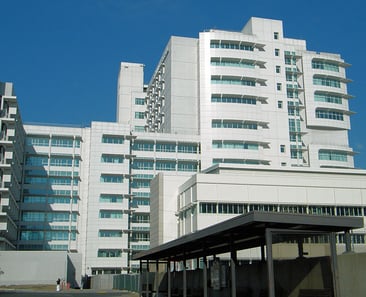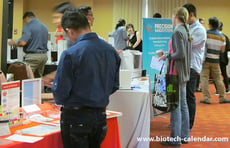UC Davis Professor Kit Lam has been awarded two separate federal grants to further his cancer research. The first grant is from the National Institute of Biomedical Imaging and Bioengineering. This 4-year, $2 million grant will fund research on the use of targeted nanotheraputics against oral cancer. The second grant is from the National Cancer Institute. This 3-year, $1.2 million research grant will be used to explore new technology for functional imaging in living cells.
 (Image courtesy of Wikimedia Commons)
(Image courtesy of Wikimedia Commons)
For the first project, Dr. Lam will partner with Michele Steffey, DVM, DACVS from the UC Davis School of Veterinary Medicine. According to an article from the UC Davis news site, they will be studying “a new approach to treating oral squamous cell carcinoma, one of the most prevalent cancers worldwide.”
According to the Oral Cancer Foundation:
- Squamous cell carcinoma accounts for 90% of oral cancers, which cause over 9,575 deaths each year.
- Close to 48,250 Americans will be diagnosed with oral or pharyngeal cancer this year. Of those 48,250 newly diagnosed individuals, only slightly more than half will be alive in 5 years.
Lam and Steffey hope that their new approach will prove effective so that it can someday be used to treat oral cancer in humans. Their study will start with mice and cats. They will test a novel nanoparticle called nanoporphyrin on mice with oral cancer. This nanoparticle, developed by Lam and UCD biochemist Yuanpei Li, can deliver toxic drugs and imaging agents to cancer cells without affecting the normal, healthy tissue that surround them.
Nanoporphyrin can also generate oxidants and heat, both of which are toxic to cancerous cells when they are exposed to light. Hence, the study also includes using the nanoparticles to deliver standard chemotherapy to cats with oral cancer. Then phototherapy will be utilized, hopefully destroying the tumor more efficiently than standard treatment alone. If the technique is successful in cats, it could potentially someday be used to treat humans.
The second research grant will support the development of Lam’s original technology called genetically encoded small illuminant, or GESI. As explained in the UC Davis article, GESI consists of short peptides that bind to an organic dye, which then sends out fluorescent light. The peptides can be genetically cloned into a specific protein inside the living cell. The fluorescent signal gives scientists high-resolution imaging of the cell’s function in real time.
About Dr. Kit Lam and the University of California Davis Medical Center:
|
RELATED ARTICLES: Total UC Davis Regenerative Medicine Funding Reaches $130 Million Breast Cancer Breakthrough at UIUC University of Arizona Receives $7M in Research Funding for Asthma Study |
Dr. Lam is the chair of the UC Davis Department of Biochemistry and Molecular Medicine. He obtained his M.D. from Stanford University School of Medicine in 1984. He joined UC Davis School of Medicine in 1999. He is both a practicing medical oncologist and laboratory investigator. Lam Lab focuses on revolutionary and innovative methods of treatment on the nano and molecular scale. These nanoparticles have been used successfully to treat several forms of cancer in animals.
The Department of Biochemistry and Molecular Medicine maintains laboratories at the Davis Campus as well as the Sacramento Campus, including the Oak Park Research Building, Research I and III Buildings, and the MIND Institute. The department’s primary research funding comes from the National Institutes of Health, National Science Foundation, Department of Defense, and a wide variety of private agencies.
On Wednesday, January 18th, 2017 Biotechnology Calendar Inc. will host the 19th Semiannual BioResearch Product Faire™ at UC Davis Medical Center. This event allows laboratory equipment suppliers to meet face to face with UC Davis researchers and discuss their equipment needs. It is a great place for lab and chemical supply companies to demonstrate their latest products. Those interested in attending should click the link below or call (530) 272-6675 for more information.
Researchers are invited to attend the trade fair for free. Get more information and preregister here:




